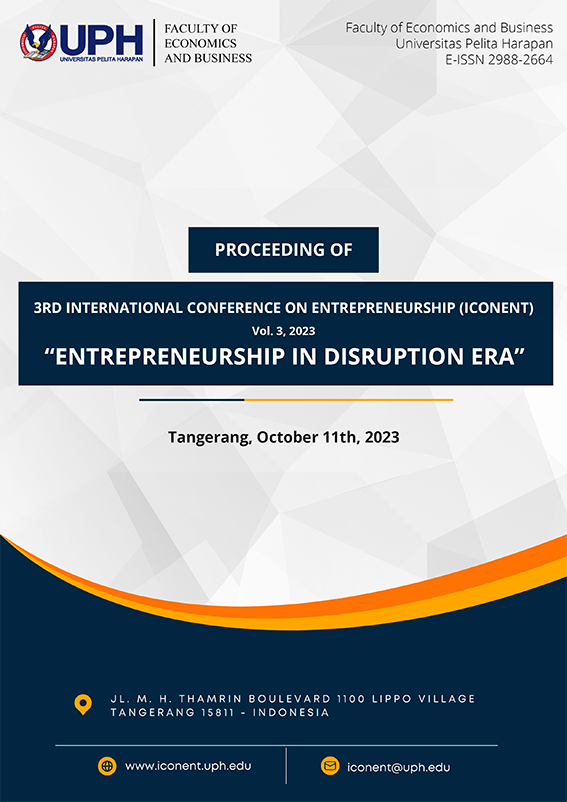Entrepreneurial Intention in Students of the Private Universities in Jakarta and Tangerang in the Era of Disruption
Keywords:
Family Environment, Entrepreneurship Education, Entrepreneurial Motivation, Interest in EntrepreneurshipAbstract
Entrepreneurship is one aspect that influences the country's economic growth. Indonesia's entrepreneurship rate is still relatively low compared to other ASEAN countries, especially during the disruption period after the Covid 19 pandemic. The research aims to examine the influence of entrepreneurship education, family environment, and entrepreneurial motivation media on entrepreneurial intentions in students of the Faculty of Economics in Jakarta and Tangerang. This research method is quantitative, with a questionnaire to collect data from 160 students selected according to the criteria. The data was processed using the SEM Algorithm with the SmartPLS 4 application. The results showed that entrepreneurship education had a positive effect on entrepreneurial interest and motivation for entrepreneurship. Entrepreneurial motivation is able to mediate the positive influence of the family environment and entrepreneurship education on interest in entrepreneurship. The family environment has a positive influence on entrepreneurial motivation, while a negative influence on entrepreneurial interest. This research has important implications for educational institutions and the government to improve entrepreneurship education and a supportive environment for students who are interested in entrepreneurship in the era of disruption.
References
Alam, S. S., Jani, D., & Alam, S. S. (2018). Impact of family environment on entrepreneurial motivation and intentions: A study of students in Indian universities. Journal of Global Entrepreneurship Research, 8(1), 1-13.
Bailey, A., Bergman, B. J., & Daspit, J. J. (2019). Developing an entrepreneurial mindset: Empowering individuals and communities for change. Entrepreneurship Education and Pedagogy, 2(2), 68-89.
Chen, Y. W., Lin, Y. H., & Chen, M. Y. (2014). Entrepreneurial motivation and intention: The role of social entrepreneurship education. Education + Training, 56(8/9), 680-696.
Daryanto, A., & Rusdiyanto, S. (2019). The effect of entrepreneurial motivation on entrepreneurial intentions: The role of self-efficacy as a mediating variable. European Journal of Business and Management Research, 4(4), 21-26.
Fatoki, O., & Chindoga, L. (2014). An investigation into the determinants of family business succession intention among owner-managers in South Africa. Journal of Economics and Behavioral Studies, 6(7), 541-553.
Fitriani, E., Agustina, L., & Sukoharsono, E. G. (2019). The influence of entrepreneurial education on entrepreneurial motivation. Journal of Entrepreneurship Education, 22(1), 1-11.
Ghozali, Imam. (2015). Aplikasi Analisis Multivariate dengan Program IBM SPSS 23. Semarang : Badan Penerbit Universitas Diponegoro.
Hair, J. F., Sarstedt, M., Ringle, C. M., and Gudergan S. P. (2019). Advanced Issues in Partial Least Squares Structural Equation Modeling (PLS-SEM), Sage: Thousand Oaks.
Hatak, I., Harms, R., Fink, M., & Kautonen, T. (2020). Faith and entrepreneurship: A review and research agenda. Journal of Business Research, 116, 176-184.
Hilmiana, J., Prabowo, T. R., & Dewi, I. R. C. (2015). The influence of family environment on entrepreneurial motivation. International Journal of Business and Management Invention, 4(1), 56-62.
Kautonen, T., van Gelderen, M., & Fink, M. (2015). Robustness of the theory of planned behavior in predicting entrepreneurial intentions and actions. Entrepreneurship Theory and Practice, 39(3), 655-674.
Kurniawan, T., Pribadi, K. S., & Basuki, S. W. (2019). The impact of family environment on entrepreneurial intention through entrepreneurial motivation. International Journal of Innovation, Creativity and Change, 5(3), 299-314.
Mustafa, M. J., Ismail, K. N. I. K., & Amin, M. (2017). The impact of family factors on entrepreneurial intentions among Malaysian undergraduates. Journal of Global Entrepreneurship Research, 7(1), 1-13.
Obschonka, M., Silbereisen, R. K., Schmitt-Rodermund, E., Stuetzer, M., & Zinn, S. (2017). Sustainable entrepreneurship: Investigating entrepreneurs’ intentions to start environmentally sustainable businesses. Journal of Business Venturing, 32(3), 215-232.
Sarasvathy, S. D. (2019). Entrepreneurship education: Critique and future directions. Edward Elgar Publishing.
Sekaran, Uma dan Roger Bougie, (2017), Metode Penelitian untuk Bisnis: Pendekatan Pengembangan-Keahlian, Edisi 6, Buku 1, Cetakan Kedua, Salemba Empat, Jakarta Selatan.
Sulistyorini, R., & Suharyono. (2018). Entrepreneurial education and entrepreneurial intentions: The role of self-efficacy and innovation. Journal of Entrepreneurship Education, 21(1), 1-12.
Togobo, N. N., & Seneadza, H. B. (2018). The influence of family environment on entrepreneurial motivation: A case of micro and small-scale enterprises in Ghana. Journal of Global Entrepreneurship Research, 8(1), 10.
Wang, D. D., Huang, L., & Wang, Y. (2018). Entrepreneurial education, entrepreneurial motivation and entrepreneurial intentions: Empirical research on undergraduates in China. Journal of Entrepreneurship in Emerging Economies, 10(2), 235-251.
Wang, X., Wu, W., & Peng, Y. (2019). The effects of entrepreneurship education on students’ entrepreneurial intentions and opportunity identification in China: A social cognitive career theory perspective. Sustainability, 11(23), 6755.
Zhou, C., Li, Y., & Wang, X. (2018). The Role of Family Social Capital in Entrepreneurial Intentions and Behaviors. Sustainability, 10(9), 3259. doi: 10.3390/su10093259

 Fakultas Ekonomi dan Bisnis | Universitas Pelita Harapan | Kampus Universitas Pelita Harapan | Gedung F Lt. 12 | Lippo Karawaci, Tangerang - 15811 | Telp 021-5460901 | Fax 54210992
Fakultas Ekonomi dan Bisnis | Universitas Pelita Harapan | Kampus Universitas Pelita Harapan | Gedung F Lt. 12 | Lippo Karawaci, Tangerang - 15811 | Telp 021-5460901 | Fax 54210992